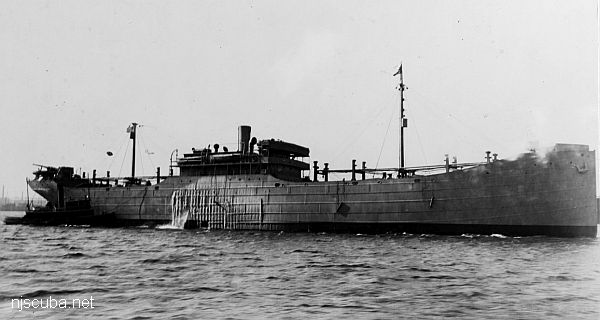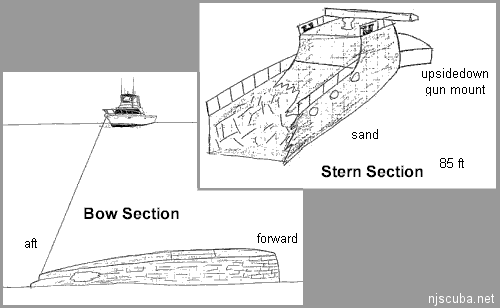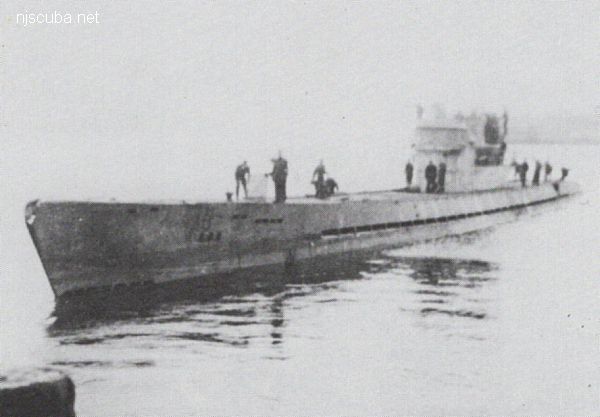Black Point

- Type:
- shipwreck, collier, USA
- Built:
- 1918, New York Shipbuilding, Camden NJ USA
- Specs:
- ( 369 x 55 ft ) 5353 displacement tons
- Sunk:
- Saturday May 5, 1945
torpedoed by U-853 - 12 casualties - Depth:
- 85 ft
broken in two, otherwise intact

SS Black Point Sailor Recalls Freighter's Sinking
Former crewman Howard Locke, now 73, attends a memorial ceremony to remember the Black Point, sunk by a German U-boat off the Rhode Island coast 53 years ago.
By MARK ARSENAULT
Journal-Bulletin Staff Writer
NARRAGANSETT -- On May 5, 1945, merchant seaman Howard Locke left the crew quarters in the stern of the freighter Black Point as it steamed past Point Judith. Locke was 19, a tall, wiry kid from Georgia, who shoveled coal for four-hour shifts to feed Black Point's gluttonous boilers.
Forty minutes into Locke's evening duty shift, about 5:40 p.m., a German torpedo blew away the Black Point's crew quarters, killing the sailor Locke had just relieved. The Black Point shuddered and the power cut out. Glare from the furnace lit a wave of ocean water rushing up from the stern. Locke scurried up to the main deck. The bow of the 369-foot transport was tilted up at about a 45-degree angle. The back third of the boat was gone.
After six years of fighting in Europe -- and just days before Germany's surrender -- World War II had come to Rhode Island, delivered by a 24-year-old at the helm of a German U-boat. The Black Point had a pet chimpanzee onboard -- a ship's mascot. As Locke leaped feet-first from the bow, "The last thing I remember was that monkey hollering" from inside the ship.
Minutes later, Locke and 16 other crewmen, "stacked like cordwood" on a crude life raft, watched their ship go under, less than three miles off Point Judith. "It stood straight up and the last thing I saw was the belly of it, " Locke said. The Black Point sank straight toward the bottom, sucking down floating oil drums, parts of a splintered lifeboat, and the howls of the chimpanzee.
HOWARD LOCKE, now 73, a retired Georgia farmer and former school-bus driver with creased, meaty hands, came back to Point Judith yesterday, on the 53rd anniversary of the Black Point's sinking. It was the first time he's been back since his ship was torpedoed by the German submarine U-853 on May 5, 1945. Twelve men on the Black Point died in the attack; Locke was one of 34 who survived.
At the U.S. Coast Guard Station at Point Judith yesterday morning, Locke wore a windbreaker and Georgia Bulldogs cap. He stood by a plaque that honors the sailors of the Black Point, and looked out into a white fog. "I had only been on the ship five days and I didn't know the guys, " he said in a gentle Georgia accent. "But it's been on my mind for 53 years, and I just wanted to see if it looks the same around here." He'll be in Rhode Island for a few days, he said. He wants to find other survivors of the Black Point. "And I just want to walk around a while."
Locke had the worst job on the Black Point in 1945 -- feeding the furnaces that gorged on coal in the dark, oily bilge of the boat. It was not what he expected. Drafted into the Army, Locke was allowed to switch to the merchant marine to help fill a sailor shortage. "I figured anything had to be better than the Army, " he said. He trained on oil-burning boats, which did not require back-breaking labor in the boiler room. But after his cousin was killed in fighting on Iwo Jima, Locke was devastated, and took the first assignment he could "just to get away."
He left his post in Virginia to join the crew of the Black Point, a transport ship carrying 7,000 tons of coal from Virginia to Boston. The old boat, built in 1918, burned coal to heat its boilers to 500 degrees. Locke shoveled the oily rocks into the furnace on a brutal schedule: four hours on, then eight hours off. Off the coast of New Jersey, Locke got seasick during a storm. He was hollered at for resting on duty when the ship needed to maintain its power. "I feel like I'm going to die, " Locke yelled back. "Let the dang thing sink."
HELMUT FROEMSDORF was a young German captain with big shoes to fill in 1945. A year earlier, Froemsdorf had accepted command of the 252-foot U-853 submarine from Gunter Kunhnke. a winner of the prestigious "Knights' Cross, " one of the rarest honors in the German military. Froemsdorf was 18 when he entered the German navy, and 22 when he became watch officer on the U- 853. After two months of commander training, he was given the helm of the deadly submarine on Sept. 1, 1944. He was then 23.
The U-853 left port in Nazi-occupied Norway with a crew of 55 on Feb. 23, 1945, for a patrol along the North American coastline. A day before the attack on the Black Point, the German high command -- realizing the war was lost ordered its U-boats to stop all hostile activities. It's unknown if Froemsdorf ever received the message, but Locke believes he did. "He knew they done lost the war, " Locke said. "He wanted to get one more."
On that night, when Locke felt the ship shudder, "I thought right away maybe it was a torpedo, or maybe we hit a mine, " he recalled. The rush of water into the boiler room sent Locke and a crewmate up an escape ladder. "Neither one of us knew where it went to, but it was going up, so we took it, " he said.
Two lifeboats had already been launched by the time Locke scaled 25 feet to the main deck, he said. Locke and another sailor used fire axes to free a stuck life raft. The raft, a 6-by-8-foot platform on pontoons, was tethered to the ship with a thick rope. Locke jumped "40 or 50 feet" from the bow to the water, and pulled the raft next to the sinking ship, he said.
Others climbed down a net and piled onto the raft. One sailor cut the tether with a hunting knife and Locke pushed the raft away by leaning a long pole against the Black Point's sinking hull. "It was a little choppy and the waves just carried us away, " Locke said. "It was a miracle we survived."
They drifted about 45 minutes before a Yugoslav freighter picked them up. A rescuing sailor warmed Locke with a tall glass of schnapps. American war boats sank the U- 853 a few hours later, killing all 55 men on board. Sympathy for the German crew comes hard to Locke. Froemsdorf, the young German captain, "really done us bad, " Locke said. "When we got him, I felt good about it. Yeah, I did."



Questions or Inquiries?
Just want to say Hello? Sign the .